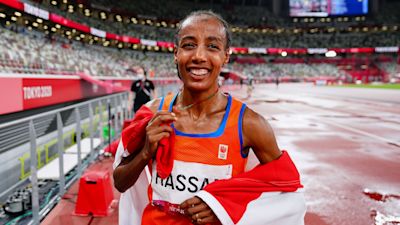Sifan Hassan: The Ethiopian refugee who tried to make Olympic history

By winning 5,000m gold on Monday, Sifan Hassan completed the first leg of what could have turned out to be the most spectacular treble in the history of women's distance running.
In remarkable scenes witnessed in the 1,500m heat earlier in the day, the Dutchwoman managed to recover quickly from a dramatic fall just after the bell, briskly picking herself up to qualify in first place.
Returning to the track in the evening, she produced her trademark final-lap burst to take 5,000m gold in 14 minutes 36.79 seconds, putting her one step closer to being able to claim an unprecedented 1500m, 5,000m and 10,000m treble in Tokyo.
The 28-year-old also stormed to 10,000m gold on Saturday, but sadly she could only come third in the 1500m final on Friday, putting an end to her plan.
“Many people say I’m crazy,” Hassan said about her task. “Believe me, I think I’m crazy too.”
The feat was arguably the most audacious Olympic tremble since Emil Zatopek won gold in the 5,000m, 10,000m and the marathon for Czechoslovakia at the 1952 Helsinki Games.
The 28-year-old's rivals are up against a formidable runner who has broken an array of bests, having won world titles in the 1,500m and 10,000m, with a bronze in the 5,000m.
Hassan was born in Ethiopia but moved to the Netherlands aged 15 as a refugee in 2008. She went on to train as a nurse and received Dutch citizenship in 2013.
Keeping her life private is important to Hassan, who rarely speaks about her reasons for leaving Ethiopia.
"No, no, I have to talk about politics," she told Dutch newspaper NRC when asked about why she left her homeland. "And I don't like to talk about politics."
Upon arrival in the Netherlands, she moved to a shelter for young asylum seekers in Zuidlaren.
“I cried every day. I couldn't go out, it was a prison," Hassan said in an interview.
Eventually she moved into a house with other asylum seekers and told her supervisor she would like to run, so was helped to join a local athletics club in Leeuwarden.
Upon arrival at Lionitas, Hassan only had an old pair of trainers, so the club provided her with a new pair of spikes, the first step on the way to the Olympics.
Speaking of her time as a young girl, Hassan says she was drawn to running as she always had "so much energy".She has been competing at the top level since 2013 - finishing third in the World Athletics Championships 1,500m race in 2015.
But her transformation into a world-beater followed a coaching change after the 2016 Olympics in Rio de Janeiro, where she finished fifth in the 1,500m. Hassan moved to the US to join the Nike Oregon Project, an elite athletics training group, under trainer Alberto Salazar, who was banned from athletics for doping violations in 2019.
During the Donald Trump's presidency, he banned travel from Islamic countries, which received criticism from many in the US.
“I feel so bad,” Hassan said. “It’s very painful. In the Netherlands it’s much better. What Trump is planning to do to Muslims, it’s not good. It’s just going to cause more problems.”
He denied the allegations and appealed against the ban, which came during the 2019 World Championships in Doha, where Hassan became the first woman to win the 10,000m and the 1,500m.
Speaking to reporters at the time, she said: “If they want to test me, they can test me every single day. Every single day. I’m always clean, I will always be clean.”
After Nike shut down the Oregon Project due to the doping allegations in 2019, she initially stayed in the US to train for the Olympics with a new coach, Tim Rowberry.
The following year Hassan set a new European record for the women's 10,000m, beating Paula Radcliffe's 2002 mark by over 24 seconds in the Netherlands.Just to top it off, in June 2021, Hassan broke the women's 10,000m world record after running 29 minutes 06.82 seconds at the FBK Games in Hengelo, the Netherlands, to beat the time of 29:17.45 set by Ethiopia's Almaz Ayana at the 2016 Olympics.